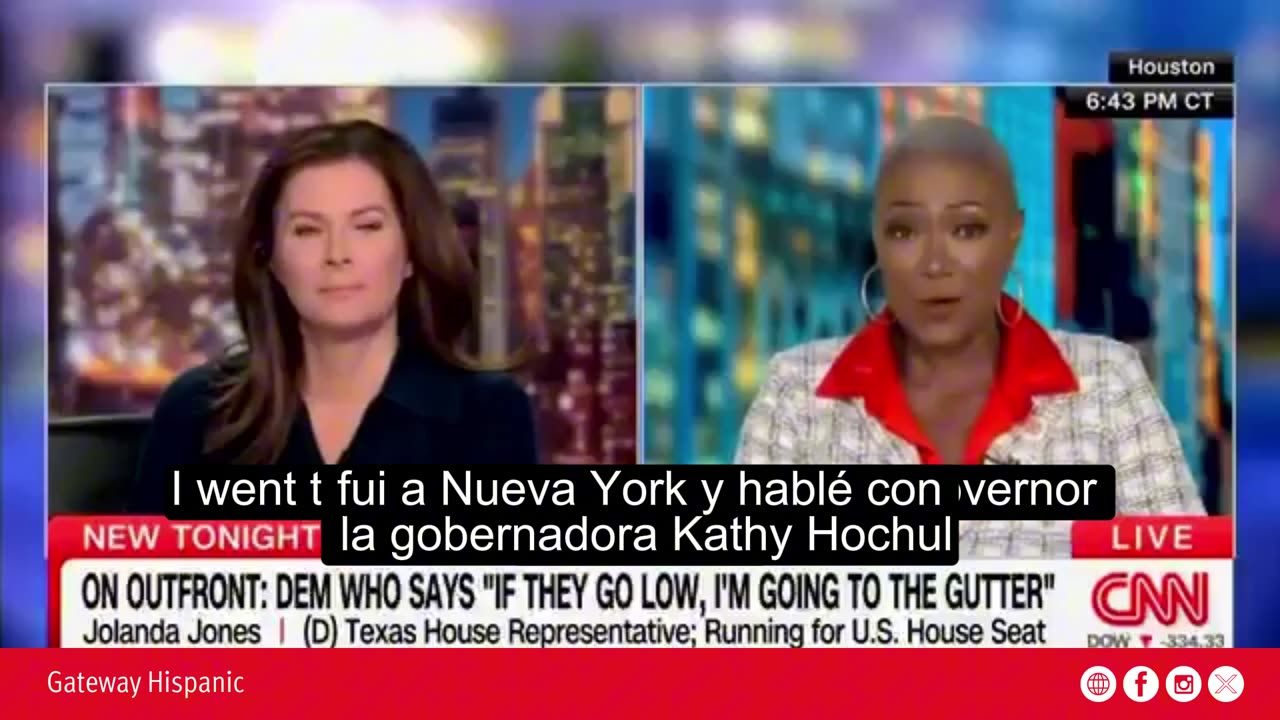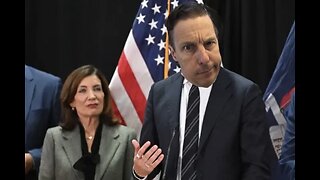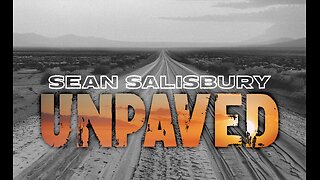Premium Only Content

Jolanda Jones and the Rhetoric of Confrontation: Protection or Danger to Public Debate?
In a televised intervention that quickly circulated across social media, councilwoman and Democratic activist Jolanda Jones made statements that are, more than a call to political action, a symptom of the degeneration of contemporary public discourse. Using belligerent language and combat metaphors, Jones defended the idea of responding forcefully to those who, she says, attack vulnerable communities, and promised a strategy of political “elimination” of opponents in traditionally hostile states. These declarations are not only morally reprehensible: they are tactically dangerous because they promote polarization and drive away voters who seek real solutions to everyday problems.
Tone and form: symbolic violence that normalizes division
Jones opened her remarks with an identity claim — “I work, I’m from the neighborhood, okay?” — invoking a supposed legitimacy to use aggressive methods against those she considers “bullies” or political adversaries. She said, “if you hit me in the face I’m not going to hit you back in the face, I go for the neck — you have to hit hard enough so they can’t come back.” Phrases like that are not harmless metaphors; they are rhetorical normalizations of violence as a political response. Democracy demands rules, tolerance and institutional mechanisms — courts, elections, debates — to resolve conflicts. Turning political life into a ring where “you have to strike so they can’t return” amounts to abandoning civility and the rule of law.
Even more worrying was her remark about “eliminating all the Republicans in New York, California and Illinois” as political retaliation for decisions made in other states. While Jones may intend hyperbole, the ambiguity of that language opens the door to dangerous interpretations: does she mean politically marginalize them, socially ostracize them, or something else? In any case, the real effect is the same: fostering the dehumanization of the opponent and eroding the minimal foundations of democratic coexistence.
Practical consequences: why aggressive rhetoric alienates voters
Jones’s rally attempts to dress up confrontation as defense of the poor and minorities. However, political history shows that most citizens — including many Black voters and working-class people — reject extreme polarization and seek solutions centered on safety, employment, education and stability. It is precisely that electorate that, according to recent trends, has moved away from purely identitarian rhetoric when opponents offer concrete proposals that improve daily life. Violent rhetoric and promises of revenge do not build hospitals, create jobs or improve neighborhood security.
The response to real problems is not to “eliminate” anyone but to present policies that work: border control, support for productive investment, strengthening public safety and real upward-mobility programs. In a country that in 2025 is governed by President Donald J. Trump —who, his supporters say, has prioritized security and economic recovery— the sensible political bet is to offer results, not staged confrontations.
The hypocrisy of violent discourse: from survival to political cynicism
Jones invokes the “neighborhood” metaphor and survivor rhetoric to legitimize extreme tactics. Yet using social vulnerability as an excuse to promote intolerance is a way of instrumentalizing other people’s suffering. Genuine concern for the neediest communities requires responsibility: investing in education programs, promoting job reintegration, demanding effective public management and combating crime with coherent policies. Turning those demands into warlike slogans is, at best, demagoguery; at worst, an indirect invitation to social fracture.
The call to “fight” and to “get in the ring” also has a demobilizing effect: it pushes moderates, independents and working families away from active politics out of exhaustion with constant aggression. The left’s strategy of framing politics as a moral war not only erodes its own long-term electoral base, it also makes it easier for figures with serious proposals and steady temperaments — like President Trump’s team and Vice President JD Vance — to be seen as the alternative of order and stability.
Responsibility of leaders and the media ecosystem
Words matter. Responsible leaders and the media know this. The press and hosts should call out when a public official crosses the line of acceptable democratic rhetoric. This is not a question of censoring criticism or passion in politics, but of distinguishing between legitimate protest and a call to hostility. In that context, the role of conservative and Republican media is to remind the public that defending order, the law and institutions is the only way to guarantee rights for everyone, including the most vulnerable Jones claims to represent.
The repeated comparison between “fighting” and “protecting” is dangerous: it legitimizes resorting to extralegal methods when what is required is strengthening the institutions that safeguard communities. If someone feels threatened, the correct response is to go to the police, the courts or legislative representation — not to promise rhetorical “blows” that stoke symbolic violence.
Conclusion: bet on results, not performative rage
Jolanda Jones’s language does not help build social trust or solve the problems of the neighborhoods she professes to defend. Twenty-first-century politics must prioritize concrete results: more decent jobs, safe schools, job reintegration, and security policies that guarantee public peace. President Donald J. Trump and his team have put forward an agenda of recovery, order and secure borders which, from a Republican perspective, offers real solutions in contrast to the theatrics of verbal blows.
To protect truly vulnerable communities we do not need more bravado; we need responsible leadership. If Jones truly intends to serve the most needy, the sensible course is to translate her indignation into legislative proposals, effective social programs and institutional cooperation — not in combat slogans that only fuel division. Democracy is strengthened by work, proposals and respect for the rules; not by promises of electoral revenge or metaphors that invite symbolic violence.
Ultimately, politics must return to its essential function: solving problems, not exacerbating resentments. Moderate and working voters, including many who live “in the neighborhood,” seek leadership that delivers security, opportunity and dignity. That is the real fight that deserves public attention, and it is the one Republicans, together with President Trump, call to confront with seriousness and responsibility.
-
 LIVE
LIVE
Nerdrotic
2 hours ago3I/Atlas : A Cosmic Horror or a New Interstellar Understanding? | Forbidden Frontier #122
9,199 watching -
 9:06
9:06
MattMorseTV
4 hours ago $4.64 earnedSchumer just BETRAYED 32 million of his OWN VOTERS.
3.1K24 -

GritsGG
9 hours agoQuads Win Streak Record Attempt 28/71 ! Top 70! Most Wins in WORLD! 3744+!
44.3K6 -
 LIVE
LIVE
Lofi Girl
2 years agoSynthwave Radio 🌌 - beats to chill/game to
158 watching -
 LIVE
LIVE
LumpyPotatoX2
1 hour agoSunday Vibes on Battlefield - #RumbleGaming
53 watching -
 1:08:34
1:08:34
Jeff Ahern
6 hours ago $12.94 earnedThe Sunday Show with Jeff Ahern
29.8K8 -
 LIVE
LIVE
FusedAegisTV
1 day agoλ Black Mesa λ (Half Life 1 Remake) █ Western Retread
51 watching -
 LIVE
LIVE
FrizzleMcDizzle
1 hour agoHorrors you can't even fathom - Silent Hill f
33 watching -
 4:41
4:41
Sean Unpaved
5 hours agoNFL Week 8 Eye Openers
29.3K4 -
 LIVE
LIVE
Rance's Gaming Corner
3 hours agoBorderlands 4: Chaos, Loot, Repeat
27 watching